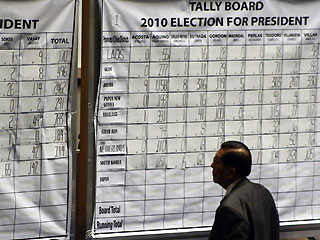"All candidates for president and all candidates for vice president got zero." This chilling statement was probably the one uttered most frequently by canvassers in Congress, as they opened certificates of canvass (COCs) containing overseas absentee votes during the second day of actual canvassing at the Batasan Pambansa. Among the country COCs with zero votes for president and vice president were those from Nepal, Anguilla, Tonga, Portugal, Lithuania, Latvia, Samoa, Congo, Fiji, Zimbabwe, Swaziland, Mauritius, Zambia, Mozambique, and Namibia.

Senate President Juan Ponce Enrile looks at partial results of OAV canvassing of presidential and vice-presidential votes in Congress Friday. Benjie Castro
Noticing the pattern, Sen. Aquilino Pimentel abruptly cut off Senate Secretary Emma Reyes in mid-sentence while she was reading out a COC, and asked: "I would just like to know why we keep on hearing that there were zero votes for all candidates." Reyes replied that it meant that no registered Filipino voter from those countries took the time to vote. As it turned out, Pimentel, who is Senate minority floor leader, merely wanted to put his observation on record and to inform the public that might be wondering about the "zero votes." "At least here, we know that the candidates really got zero votes," he said, alluding to a common complaint by losing candidates that they got zero votes in certain areas in the last elections. Pimentel requested that Congress should list the countries with zero voter turnouts, so that “we would have legislative discussions either to encourage [those voters] to come or do away with them." Majority Floor Leader Sen. Juan Miguel Zubiri, who temporarily took over as chairman of the Senate panel, took note of Pimentel's observation and lamented the low turnout among Filipino voters in those countries. "We spent money sending delegations in this part of the world and yet after two elections already, they have failed to vote," Zubiri said.

The list shows countries with a zero voter turnout in the 2010 national elections. The second column shows the number of registered overseas absentee voters in each country.
The government said more than 153,000 of the almost 590,000 registered overseas Filipino voters from 89 foreign service posts participated in the recently-concluded elections - comprising a voter turnout of 26 percent. This year's OAV turnout was higher than the 2007 presidential elections' 16 percent, but lower than 2004's 65 percent. The OAV started on April 10 and lasted for one month, ending a day before elections in the Philippines. [See related:
DFA submits poll returns from OFW voters] Except for Hong Kong and Singapore which used the automated election system, all other Philippine diplomatic posts employed either personal or postal voting.
Zero-vote phenomenon The phenomenon of candidates getting zero votes had also hounded a number of precinct clusters within the Philippines, setting up alarm signals about possible cheating and other poll irregularities. A message recently circulated on the Web claiming that in a number of precincts, certain candidates took virtually all the votes, while their rivals got zero votes. [See:
Bloc voting on May 10 mostly benefits Noynoy Aquino] In Rodriguez town in Rizal, for example, the election results from at least four clustered precincts showed that nearly 100 percent of voters chose the same candidate for each post, zeroing out most other candidates. A check made by GMANews.TV later revealed that the voters belonging to these precincts were all residents of the Pamayanan ng Tagumpay (Victory Town), a housing settlement for members of Iglesia ni Cristo, a religious organization that openly practices "block voting."
—JV, GMANews.TV 






